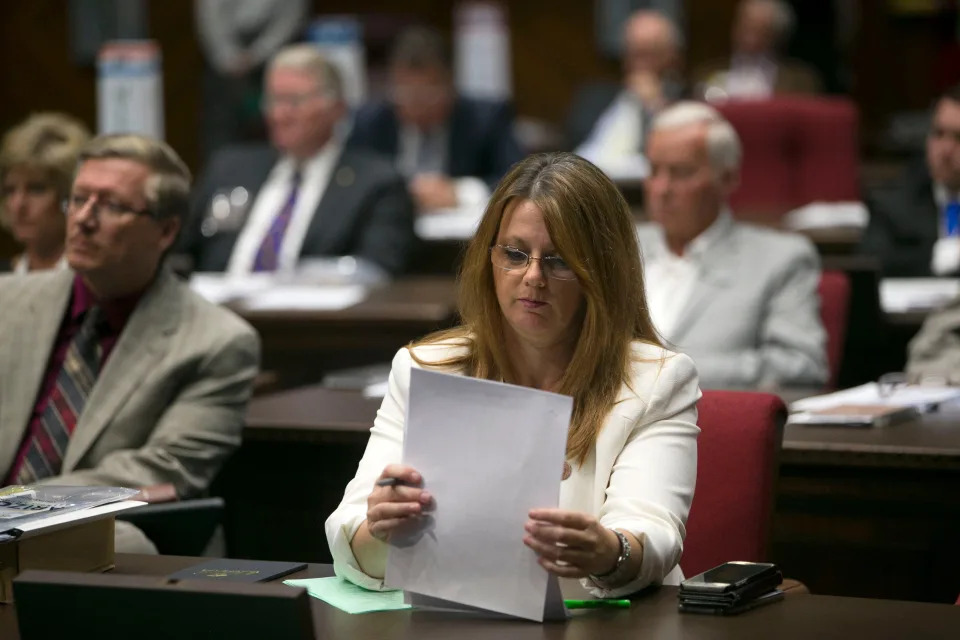AZ Central – The Arizona Republic
Was that a Senate hearing on Arizona elections or an SNL skit?
Laurie Roberts, Arizona Republic January 25, 2022

The first seven of a bumper crop of bills aimed at fixing non-existent problems in Arizona’s elections glided through a Senate panel on Monday, floating forth on a bulging cloud of hot air and conspiracy claims.
This, of course, was no surprise.
The Senate Government Committee is stacked with some of the Legislature’s biggest super spreaders of election misinformation and/or outright lies: Sens. Kelly Townsend of Apache Junction, Sonny Borrelli of Lake Havasu City, and — a late addition courtesy of Senate President Karen Fann — Wendy Rogers of Flagstaff.
Rounding out the Republican contingent on the seven-member panel was Senate Majority Leader Warren Petersen of Gilbert, Fann’s No. 2 on the election audit.
Is it any wonder that most voter rights groups skipped Monday’s meeting? Deaf ears and all that.
Townsend, the panel’s chairwoman who recently announced she’s running for Congress in a Tucson district, presided over a meeting that was more a rally by the conspiracy mongers than it was a deliberative legislative hearing, with speaker after speaker rising to describe the many fantastical ways in which the 2020 presidential election was stolen.
Never mind the lack of any actual evidence or the inconvenient fact that many of their claims have been investigated and found to be false.
Yet not one Republican on the panel pointed this out as the conspiracy theories flew during Monday’s televised hearing.
The issue was election integrity, after all, not legislative integrity.
No less than the GOP’s leading light Kari Lake — introducing herself as the “Trump-endorsed candidate for governor” — was there to offer up the long-debunked claim that a Sharpie stole her vote.
“This last election was shady,” she said. “It was shoddy, it was corrupt, and our vote was taken from us. I’m a citizen. I feel my vote was taken. I was handed a ballot and the Sharpie that was given to me bled right through, so I believe my vote may have been adjudicated. Somebody else decided who I voted for and that’s unacceptable.”
It absolutely would be unacceptable, if there was a shred of truth to it.
Attorney General Mark Brnovich investigated Sharpiegate — the theory that Republican voters were given Sharpies so that their votes would not be counted — and found it to be fiction. Sharpies, in fact, were recommended for use by the manufacturer because the ink dries quickly and doesn’t smear when ballots are run through the tabulation machines.
That, however, didn’t stop Christina Smith, a congressional candidate who said the government sent her husband an early ballot in 2020 but refused to send her one because she voted for Donald Trump four years earlier.
“They forced me to use Sharpies on thinner paper so my vote wouldn’t count,” she told the committee. “The government knows how we vote. They know he voted Democratic. They know I voted Republican.”
That wasn’t even the most outlandish claim during the four-hour hearing.
That honor went to Gail Golec of Scottsdale, a frequent purveyor of conspiracy theories who claimed, without evidence, that half of the people on Arizona’s voter registration rolls “have no Social Security or driver’s license numbers or dates of birth assigned to them”.
She also flatly said that 27,000 “counterfeit” ballots were cast in the 2020 election.
“Batches and batches of Biden ballots,” she told the panel.
When Sen. Sally Ann Gonzales, D-Tucson, asked Golec why the audit never discovered these all these phony Biden ballots, Townsend quickly intervened.
To reprimand Gonzales.
“As far as establishing if there was fraud, that’s not appropriate for this committee,” Townsend scolded.
No, but passing bills based upon non-existent fraud apparently was appropriate.
In all, seven bills were approved on partyline votes.
Bills to raise the threshold for automatic recounts in close races and to require the state to post pictures of every ballot online for public viewing, searchable by precinct.
A bill to eliminate all-mail voting by cities and school districts because … what … too many people vote?
A bill to allow the Legislature to investigate federal-voters — the ones who registered under federal law, which requires no proof of citizenship, and thus can only vote in federal races. County elections officials already check a variety of records to try to determine citizenship for those voters and if they find evidence that someone’s not a citizen, that’s already a crime.
And my personal favorite: Borrelli’s bill to ensure that no bamboo slips into our ballots. This, by adding watermarks, holographs, “stealth numbering in ultraviolet, infrared or taggant inks”, “invisible ultraviolet microtext”, “three-color invisible ultraviolet guilloche with an anti-copy feature”, “a serialized black QR code” to track an individual voter’s ballot, and 13 other “ballot fraud countermeasures”.
No disappearing ink or self-destruct feature that I could detect but 19 “countermeasures” in all, assuming you can find a printer who can do all that.
“Any illegal ballot that gets injected into the system suppresses a legal vote,” Borrelli said.
It’s worth repeating the fact that here in the real world, the Senate’s own audit found no evidence of fraud.
Republican-run Maricopa County, after a three-month study of the audit’s findings, found just 87 of the 2.1 million ballots cast were problematic. Of those, 50 were votes that were counted twice due to a county worker’s error.
But hey, don’t let facts get in the way of a bunch of new election laws designed to solve problems that don’t exist. With many more to come, including bills that will undoubtedly make it more difficult to vote.
With the possible exception of the recount bill, none of them are needed, of course, but won’t it look fantastic on this year’s re-election brochure?
